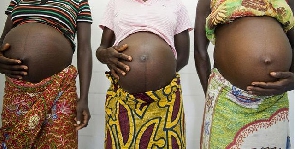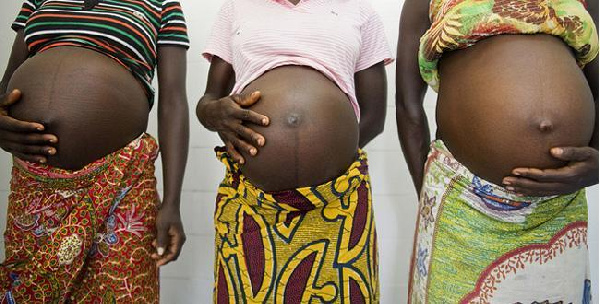 File photo of pregnant teens
File photo of pregnant teens
The Upper East Region has recorded a total of 2,436 teenage pregnancies from January to May 2025, raising fresh concerns over adolescent health and protection in the region.
Charity Tanni, the Upper East Regional Health Information Officer of the Ghana Health Service who revealed this said 25 of the teenagers were between ages 10 and 14, while 2,411 of them were between ages 15 to 19.
Tanni was making a presentation in Bolgatanga during a review meeting on the Essential Services Package (ESP) for women and girls subjected to violence, a project being implemented by the Department of Gender in collaboration with the Upper East Regional Coordinating Council with Funding support from the United Nations Population Fund (UNFPA).
The meeting brought together key stakeholders from institutions including the Ghana Health Service, Ghana Education Service, DOVVSU, Legal Aid Commission, Department of Social Welfare, Judicial Service, and Civil Society Organisations.
The data presented further indicated that the Bawku West District recorded the highest number with 372 cases, followed by Pusiga with 276, Bongo with 212, Talensi with 210, Kassena Nankana West with 198, the Kassena Nankana Municipality with 196 and the Bolgatanga Municipality with 152.
Others included Bawku Municipality with 147, Tempane with 123, Garu with 118, Builsa South with 116, Nabdam with 100, Binduri with 86, Builsa North with 78, and Bolgatanga East recording the least of 52 teenage pregnancies.
James Akandi, the Registrar at the Circuit Court, indicated that among the 24 gender-based violence cases before the court, 14 of them were defilement cases.
He, however, bemoaned the failure of witnesses to show up in court to testify, coupled with resource and logistical constraints as impeding justice delivery.
Assistant Superintendent of Police (ASP) Mariam Awemoni, the Regional DOVVSU Coordinator, indicated that the lack of coordination between her office and the district offices across the region was not only thwarting the fight against gender-based violence but also hampering data gathering.
“As the Regional Coordinator, I don’t get reports from our officers at the district level.
They report to the District Police Commander who reports straight to National, and so unless a case is reported directly to us, we are not able to get data from the district level on cases and their progress,” she stated.
James Twene, the Acting Upper East Regional Director of the Department of Gender, called for stronger institutional collaboration to address gender-based violence and teenage pregnancy.
According to him, coordination, data gathering and segmentation were key to the fight against gender-based violence and he charged the essential service providers to work collaboratively on cases for positive results.
Yvonne Wonchua, the UNFPA Focal Person at the Regional Coordinating Council, also highlighted the importance of coordination among ESP institutions and called for resource mobilisation to improve service delivery and survivor protection.


